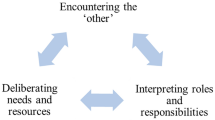Abstract
The purpose of this chapter is to discuss the meaning of an anthropological approach with a focus on methodological study for management theory (including the theory of business administration). We begin with a brief overview of the history of management theory and then focus on two methodologies based on “scientific” and “clinical” knowledge. The difference between scientific and clinical knowledge is that the first is theoretical knowledge comprised of verifiable and reproducible propositions, but the second is knowledge of theory as both conceptual schemes and their application in practice. These methodologies have conflicting viewpoints; however, they coexist in the practical business field, and this is the methodological uniqueness of management theory. Both theories interact in the practical field of management, and they cannot be separated. Therefore, we have to provide a new methodological standpoint that includes both clinical and scientific knowledge. We discuss the capability of an anthropological approach for creating new methodologies in business administration.
Access this chapter
Tax calculation will be finalised at checkout
Purchases are for personal use only
Similar content being viewed by others
Notes
References
Barnard CI (1938) The functions of the executive. Harvard University Press, Cambridge
March JG, Simon HA (1993) Organizations, 2nd edn. Blackwell, Cambridge
Mitsui I (1995) America-keieigakushi no hōhōronteki kōsatsu: Neo-Pragmatism to management-shisō (A methodological study of the history of American management thought: Neo-Pragmatism and management thoughts) (in Japanese). Keieigakushi-gakkai nenpō (J Soc Hist Manage Theories) 2:139–147
Mitsui I (2001a) Barnard-riron no hōhōron-teki kiso (The methodological base of Barnard’s management theory) (in Japanese). In: Kono T, Yoshihara M (eds) Keieigaku paradigm no tankyū (In search of management paradigm). Bunshindō, Tokyo, pp 47–60
Mitsui I (2001b) America keieigaku ni okeru pragmatism to ronri-jisshōshugi (Pragmatism and logical-positivism in American management thought) (in Japanese). Keieigakushi-gakkai nenpō (J Soc Hist Manage Theories) 8:57–72
Mitsui I (ed) (2013) Asia-kigyō no keieirinen: seisei denpa keishō no dynamism (Management philosophy of Asian companies: dynamism of creation, diffusion, and succession) (in Japanese). Bunshindō, Tokyo
Mitsui I, Deguchi T, Sumihara N (1999) Matsushita Konosuke no shasō: Hoshin no kokoro wo katachi ni. (Corporate funeral of Kohnosuke Matsushita: the expression of mourning for a great company founder) (in Japanese). In: Nakamaki H (ed) Shasō no keiei jinruigaku (The anthropology of administration: Company funerals). Tōhō Shuppan, Osaka, pp 149–166
Nakamaki H (ed) (1999) Shasō no keiei jinruigaku (The anthropology of administration: company funerals) (in Japanese). Tōhō Shuppan, Osaka
Nakamaki H, Hioki K (eds) (1997) Keiei jinruigaku kotohajime (Toward an anthropology of administration) (in Japanese). Tōhō Shuppan, Osaka
Nakamaki H, Hioki K (eds) (2003) Kigyō-hakubutukan no keiei jinruigaku (The anthropology of administration: company museum) (in Japanese). Tōhō Shuppan, Osaka
Nakamaki H, Hioki K (eds) (2013) Kaisha-shinwa no keiei jinruigaku (The anthropology of administration: company mythology) (in Japanese). Tōhō Shuppan, Osaka
Quine WVO (1980) From a logical point of view, 2nd edn. Harvard University Press, Cambridge
Roethlisberger FJ (1942) Management and morale. Harvard University Press, Cambridge, Reprinted edition: Wren D, Sasaki T (eds) (2004) Human relations in intellectual legacy of management theory, vol 5. Pickering & Chatto, London
Roethlisberger FJ (1977) The elusive phenomena. Harvard University Press, Cambridge
Rorty R (1982) Consequences of pragmatism. University of Minnesota Press, Minneapolis
Simon HA (1997) Administrative behavior, 4th edn. Free Press, New York
Tomita Y (1994) Quine to genndai America tetsugaku (Quine and modern American philosophy) (in Japanese). Gendaishisō-sha, Tokyo
Wolf WB, Iino H (eds) (1986) Philosophy for managers: selected papers of Chester I. Barnard. Bunshindō Publishing, Tokyo
Author information
Authors and Affiliations
Corresponding author
Editor information
Editors and Affiliations
Rights and permissions
Copyright information
© 2016 Springer Japan
About this chapter
Cite this chapter
Mitsui, I. (2016). The Meaning of an Anthropological Approach for Management Studies: Beyond “Clinical” and “Scientific” Knowledge. In: Nakamaki, H., Hioki, K., Mitsui, I., Takeuchi, Y. (eds) Enterprise as an Instrument of Civilization. Translational Systems Sciences, vol 4. Springer, Tokyo. https://doi.org/10.1007/978-4-431-54916-1_4
Download citation
DOI: https://doi.org/10.1007/978-4-431-54916-1_4
Publisher Name: Springer, Tokyo
Print ISBN: 978-4-431-54915-4
Online ISBN: 978-4-431-54916-1
eBook Packages: Business and ManagementBusiness and Management (R0)




